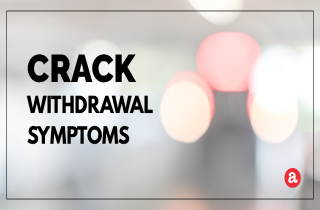Psychological compulsion and physical dependence are responsible for many of the symptoms of crack withdrawal. Extreme craving, the anxiety, depression, the restlessness, that peculiar inability to feel pleasure, the shakes, muscle pain, nausea – these are just some many typical crack withdrawal symptoms. But what else can you expect during crack withdrawal? And how can you find help with crack addiction?
Were we take a look at what happens during crack withdrawal, why it happens, what is withdrawal from crack like, and how you can ease the process. If you have any further questions how you can withdraw from crack, you can always use our comment form below.
Why do crack withdrawal symptoms occur?
A drug that produces a near instantaneous high, crack is a stimulant that alters the brain chemistry of the user. Specifically, cocaine changes the production of the brain’s neurotransmitters during crack use. This change in levels of dopamine and serotonin are responsible for the change in behavior, thought process, perception and emotions of crack addicts. So what happens during withdrawal exactly?
When a crack user keeps using the drug, the body adjusts to the presence of the cocaine in the system. The normal production of neurotransmitters is modified and the drug no longer produces as intense a high as it used to. This is the dangerous phase of developed tolerance when a user is likely to increase their intake of crack to achieve euphoric effect and could end up overdosing. And when cocaine is removed, the body reacts to the abrupt chemical changes.
When an addict stops using crack, the central nervous system reacts to the absence to cocaine in the system. An array of symptoms will typically manifest, clinically called “Crack Withdrawal Syndrome”. In fact,a crack addict will typically feel a number of symptoms (both physical and psychological) manifest in the hours after last use. Long term withdrawal symptoms – also known as sub-acute withdrawal or protracted withdrawal symptoms – could occur weeks, months or even years after the initial detox phase.
What are symptoms of crack withdrawal?
Since crack is a strong stimulant drug that engenders feelings of euphoria, lowering of inhibitions, delusions of grandeur and lowered anxiety… the crash afterwards can be particularly harrowing. Also crack is one of the most addictive forms of cocaine; another reason why the following withdrawal symptoms can occur in a particularly acute form. Symptoms of crack withdrawal include:
- aggression and violent incidents
- agitation
- anhedonia (the inability to feel pleasure)
- anxiety
- craving for the drug
- depression and lack of motivation
- exhaustion and fatigue
- feelings of paranoia
- flu like symptoms
- irritability and restlessness
- mood swings
- musculoskeletal pain
- psychosis, hallucinations and other mental disturbances
- sleep disturbances and vivid nightmares
- suicidal feelings
Crack withdrawal symptoms: How long?
Crack withdrawal symptoms can start hours after the last hit and could carry on for days, weeks or even months and can be very severe. Since users develop a psychological attachment to crack, the urge to use may resurface even after years of sobriety.
Crack cocaine relapse is very dangerous because the possibility of overdosing is very high, particularly when the body has re-established normalcy and has reverted to functioning without the drug. This is because the body will perceive what was a ‘normal’ dose during heavy use as an extremely high dose after having been sober for a significant length of time.
Crack withdrawal symptoms treatment
The aims of crack withdrawal symptoms treatment or recovery, are
(a) staying sober (abstinence)
(b) prevention of relapse and
(c) rehabilitation of the addict
The following aspects are important the treatment of during crack withdrawal symptoms.
Detox – This stage of treatment may require help from a hospital or outpatient setting. The user can undergo medical assessments and abstain from using in a supervised, phased manner. Heavy users may need to taper off their drug in a safe manner or as prescribed by the addiction specialist or physician.
Medications – Prescription drugs may also help manage difficult withdrawal symptoms or could be an effective means to help the user go off their drug gradually. Anti seizure medication, muscle relaxants, anti psychotic drugs, pain relievers and wakefulness promoting drugs could be beneficial during this phase. Medications prescribed should be such that the user doesn’t end up swapping one addiction for another.
Rehab – The physical dependence on crack is far simpler to resolve than the psychological addiction to the drug. Therapy and counseling are the most effective means to ensure lasting recovery. The addict typically needs guidance, structure and monitoring to help them remain sober.
Psychotherapy – Behavioral and psychological treatments can help a crack addict identify triggering behaviors and people and so the user can avoid them in favor or more sober environments and communities. It will also help the user develop coping mechanisms for stressful situations and triggering events.
Family therapy – Another important aspect of rehabilitation of the addict is to involve family and close friends in the recovery. Those around the addict need to understand how to alter enabling behaviors that may be fueling the addicts’ habit. Enabling behaviors could include financial support, inability or refusal to recognize signs of use, finding excuses for the addict’s behavior, etc. Such codependent behaviors can be addressed via family therapy settings.
Support systems – Joining a support group such as Cocaine Anonymous or even online support forums can help recovery and reduce feelings of isolation. Learning healthy behaviors that include regular physical exercise and a nutritious diet can also help support recovery.
Questions about crack withdrawal
Do you still have questions about crack withdrawal? Please leave your questions in the comments section below. We do our best to respond to you personally and promptly.









Related Posts